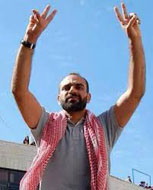
In a remarkable feat, long term hunger striker Samer Issawi ended his protest action on April 23 after signing an agreement with Israel which guarantees his release, his lawyer Jawad Bolous said. The deal will see Issawi released to his hometown of Essawiyeh, Jerusalem after serving eight months in jail, following 266 days of refusing food in protest against his re-arrest by Israeli forces. The agreement was signed at Kaplan Medical Center in Israel where Issawi is currently being held, and both his uncle and brother were present at the signing, Bolous said. Israeli officials reportedly agreed to the deal after Issawi said Monday that he would boycott any future court hearings and refuse to recognize the legitimacy of Israeli courts.
Samer Issawi "feels he achieved a victory thanks to his adherence to principles he believed in," his uncle Hani said. Issawi's victory was partly due to his rejection of Israeli efforts to deport him and so he "achieved a basic Palestinian goal of resisting exile and adherence to the right of return," his uncle added. He will be released from Israeli detention on Dec. 23.
On April 27 Israeli forces detained four children for allegedly throwing stones in Hebron, local sources said. The children, aged 8-12, were detained along with the father of one who tried to stop soldiers from arresting his son.
On April 26, Israel's army announced it would stop using munitions containing white phosphorus, after it was internationally condemned during a military operation against Gaza in 2008-2009. Ironically enough, this comes only after Israel’s criticism of Syrian President Bashar Al-Assad’s alleged use of chemical weapons against his own people. Shells containing the chemical "will no longer be used," according to Israel’s official statement. "In around a year, the Israeli military will have developed new munitions which can create smoke screens and that uses only gas. This will replace the current munitions which contain small amounts of phosphorus," it said.
On April 25, Israeli forces uprooted over 700 olive trees near Arraba village in the northern West Bank, Palestinian Legislative Council member Najah Abu Bakr said. The trees belonged to Palestinians in Arraba, south of Jenin, close to the Israeli settlement Mevo Dotan. Additionally, Israeli forces destroyed over 1,300 olive trees in the south Hebron hills of the southern West Bank on April 23.
Israel’s top legal official, Attorney General Yehuda Weinstein responded to the Association for Civil Rights (ACRI) in Israel, stating that Israeli security officials at Ben Gurion airport are legally allowed to demand access to tourists' email accounts and deny them entry if they refuse. Details of the policy were released by Yehuda Weinstein on April 24. In June 2012, ACRI's Lila Margalit wrote to the attorney general demanding clarification following media reports about security officials demanding access to tourists' email accounts before allowing them into the country.
"In a response dated April 24, 2013, the attorney general's office confirmed this practice," ACRI said, quoting sections of the document which said it was only done in exceptional cases where "relevant suspicious signs" were evident and only done with the tourist's "consent". "However, the attorney general's office also noted that while a tourist may refuse such a search, 'it will be made clear to him that his refusal will be taken into consideration along with other relevant factors, in deciding whether to allow him entry to Israel'," it continued. ACRI slammed the policy as a "drastic invasion of privacy" heaping scorn on the idea a tourist could freely give their consent while facing the threat of possible deportation if they refused. "Such 'consent' -- given under threat of deportation -- cannot serve as a basis for such a drastic invasion of privacy," Margalit said. "Allowing security agents to take such invasive measures at their own discretion and on the basis of such flimsy 'consent' is not befitting of a democracy."
This past Sunday marked Bethlehem’s first-ever marathon. Hundreds of athletes on April 21 braved freezing rain to take part in this historic race, which was won by a Palestinian runner from the West Bank town of Jericho. Some 500 runners, half Palestinians and half foreigners, took part in the different legs of the race, organizers said, which began at 8:00 a.m. as the West Bank town was buffeted by cold winds and an unseasonable downpour.
Around 100 competitors took part in the full 26 miles, while another 150 joined the half marathon, organizers said. Some 250 joined either the six-mile or three-mile races. Another 26 runners from Gaza were denied permission by Israel to travel to Bethlehem to join the race. Sunday's race, which is called the "Right to Movement Palestine Marathon" and is the brainchild of two Danish women athletes, takes runners on a tour of the hilly southern West Bank city which Christians believe is the birthplace of Jesus.
Etidal Abdelghani, deputy director general of the Palestinian Olympic Committee, which co-sponsored the event, said the aim of the race -- the first West Bank marathon to conform to international standards -- was to demonstrate just that. "This is a message that we have the right to move and to have sports events in Palestine without any obstacles," she said.







